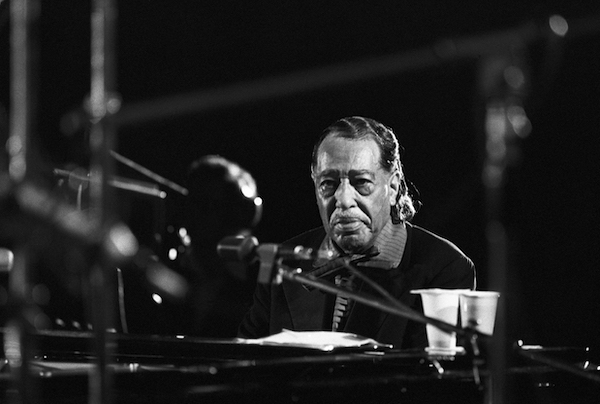Jan 13, 2026 2:09 PM
More Trump-Kennedy Center Cancellations
The fallout from the renaming of the John F. Kennedy Center for the Performing Arts to include President Donald…

Even in his 70s, Duke Ellington was moving forward and keen to win new audiences.
(Photo: Courtesy Storyville)Science fiction writer Arthur C. Clarke once wrote, “Behind every man now alive stand thirty ghosts, for that is the ratio by which the dead outnumber the living.” Some musicians feel that current reissue programs are like that, new work crowded out by recordings made decades earlier.
While there’s some justice in that thought, who would deny the pleasure of meeting overlooked or long-forgotten recordings again? In the case of Mal Waldron’s Free At Last (ECM 1001; 69:18 ****), many of those who’ll listen to the new extended edition won’t have been born when the record was made in 1969. As the catalog number suggests, it was the first release on Manfred Eicher’s Edition of Contemporary Music label, a darkly brooding set of mostly originals in Waldron’s then-recently developed free style, where he largely abandoned soloing on chord changes in favor of playing repeated rhythmic cells. Supported by the splendid Isla Eckinger on bass and the thoroughly undervalued Clarence Becton on drums, the album stands at the beginning of the ECM story as part-harbinger, part-outlier, darker and less lyrical than much of the label’s later output.
Sometimes the past can seem darker than the present, sometimes sunnier, but definitely the latter in the case of the Cry Babies, whose self-titled debut disc (Far Out FORDIS06; 42:04 ***) has been reissued for the first time on vinyl. Also from 1969, its blend of Brazilian samba jazz and North American soul, masterminded by group co-ordinator Nelson Attílio and saxophonist arranger Oberdan Magalhães, seems as prescient of future directions as Waldron’s ECM debut. Cry Babies continued as Banda Black Rio, but they never sounded more heartful and abandoned than on this one.
If Waldron’s pianism came largely out of Monk, there was a lot of Duke Ellington in there, too. Ellington’s orchestra—the lineup that made The Afro-Eurasian Eclipse—went on a sweeping six-week tour through Europe and the Soviet Union during autumn 1971. Nowhere was it greeted more rapturously than in Sweden, which always had a special place in Ellington’s heart. Uppsala 1971 (Storyville 101842; 79:04 ***1/2) documents the second of two performances given on a single day by a band that was not just well rehearsed, but bursting to communicate the new, rock-inspired energy of things like “One More Time For The People,” one of the most eye-popping moments of Duke’s career. The early part of the program is more familiar, with band themes, medleys and retrospectives, but the date clearly underlines that even in his 70s, Ellington was moving forward and keen to win new audiences.
Japanese free-jazz and fusion have received a lot of attention recently through reissues. Welcome enough, but it tends to blur the extraordinary quality of Japanese hard- and post-bop in the 1970s. No group better conveys that energy and class than The Hideto Sasaki—Toshiyuki Sekine Quartet +1 whose semi-legendary release Stop Over (BBE 589; 46:30 ***1/2) was released in an edition of only 100 in 1976 and distributed largely to family and friends. BBE J Jazz Masterclass is specifically curated to present the finest in Japanese modern jazz, and this is its signature release, a torrid date that sees trumpeter Sasaki and pianist Sekine blazing through material by Denny Zeitlin, Bobby Hutcherson, a magnificent “Soultrane” and some original material.
Whether playing chordally or in modes, the group is completely assured, and it would be hard to persuade a listener that this wasn’t an ensemble out of the Blue Note or Riverside stables. DB

Belá Fleck during an interview with Fredrika Whitfield on CNN.
Jan 13, 2026 2:09 PM
The fallout from the renaming of the John F. Kennedy Center for the Performing Arts to include President Donald…

Peplowski first came to prominence in legacy swing bands, including the final iteration of the Benny Goodman Orchestra, before beginning a solo career in the late 1980s.
Feb 3, 2026 12:10 AM
Ken Peplowski, a clarinetist and tenor saxophonist who straddled the worlds of traditional and modern jazz, died Feb. 2…

The success of Oregon’s first album, 1971’s Music Of Another Present Era, allowed Towner to establish a solo career.
Jan 19, 2026 5:02 PM
Ralph Towner, a guitarist and composer who blended multiple genres, including jazz — and throughout them all remained…

Rico’s Anti-Microbial Instrument Swab
Jan 19, 2026 2:48 PM
With this year’s NAMM Show right around the corner, we can look forward to plenty of new and innovative instruments…

Richie Beirach was particularly renowned for his approach to chromatic harmony, which he used to improvise reharmonizations of originals and standards.
Jan 27, 2026 11:19 AM
Richie Beirach, a pianist and composer who channeled a knowledge of modern classical music into his jazz practice,…